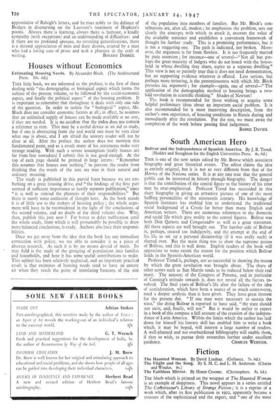South American Hero
Bolivar and the Independence of Spanish America. By J. B. Trend. (Hodder and Stoughton for the English Universities Press. 4s. 6d.) Bolivar and the Independence of Spanish America. By J. B. Trend. (Hodder and Stoughton for the English Universities Press. 4s. 6d.) THIS is one of the new series edited by Mr. Rowse which associates biography and great historical events. The editor claims the idea as entirely original, but it is not so very different from that of the Heroes of the Nations series. It is at any rate true that the general public can be interested in history through biography. The danger is that the contribution of-the central figure to the history of his time may be over-emphasised. Professor Trend has succeeded in this short biography in giving an attractive picture of one of the most baffling personalities of 'the nineteenth century. His knowledge of Spanish literature has enabled him to understand the traditional social background of a Creole far better than many English and American writers. There are numerous references to the domestic and social life which give reality to the central figures. Bolivar was both Don Quixote and Conquistador as well as a great statesman. All these aspects are well brought out. The harsher side of Bolivar is, perhaps, treated too indulgently, and the attempt at the end of his life to set up a personal dictatorship (if it was really such) is slurred over. But the main thing was to show the supreme genius of Bolivar, and this is well done. English readers of the book will appreciate to some extent the reason for the position which Bolivar holds in the Spanish-American world.
Professor Trend is, perhaps, not so successful in showing the means by which the great revolution was brought about. The share of other actors such as San Martin tends to be redticed below their real merit. The account of the Congress of Panama, and in' particular of Canning's attitude towards it, does not reveal all the factors in- volved. The final years of Bolivar's life after the failure of the idea of confederation, which have been a source of so much controversy, need a deeper analysis than is here given. They have great interest for the present day. " If' one man were necessary to sustain the state," the dying Bolivar is reported to have said, " the state should not exist, and, finally, will not." But it would be unfair to expect in a book of this compass a full account of the creation of the indepen- dence of Latin America. Within the limits which the author has laid down for himself his literary skill has enabled him to write a book which, it may be hoped, will interest a large number of readers. A well-planned and not overburdened bibliography will enable them, if they so wish, to pursue their researches further under excellent


































 Previous page
Previous page